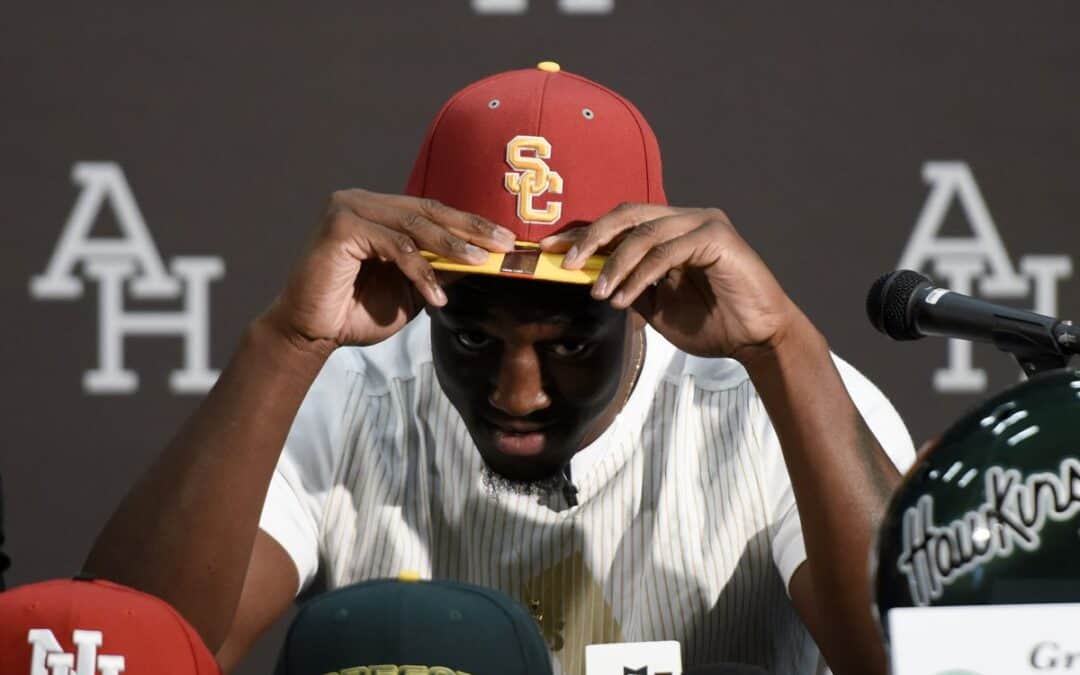In short, “you ain’t getting one.”
Sorry to be so blunt, but hear me out… there’s better news below…
7% of all high school football players will go on to play football in college (any college). It’s not that more of them couldn’t find a school to play for; most high school seniors simply don’t want to commit to what it takes to play at the college level.
But if that’s your goal (and why shouldn’t it be) then you want to do everything to be a part of that 7%. Thing is, most high schoolers only think about “getting a scholarship” at a DI school. It’s intoxicating… but roughly 20% of those few athletes will get some kind of athletic scholarship to play (that’s 2% of all high school players).
Are your skills in that top 2%?
There are 242 D3 non-scholarship football programs in the country (254 NCAA D1 & 169 D2 schools). But, you want the scholarship… so are you after a full ride that covers tuition, room & board for four years? Or any partial scholarship that covers some of the expenses? Getting a scholarship for $10,000 to cover tuition for a university that costs $40,000yr. is helpful, but is it better than the opportunity to play at a DIII school that costs $10,000 for the year?
Understand, almost all of the 254 D1 school have a kicker and punter on scholarship on their team, but how many full rides do you think are awarded to a kicker, “fresh out of high school” in any given year?
I don’t know for sure, but figured that perhaps 30 high school kickers in America would be offered a “full ride” scholarship. So, I asked around to college head coaches I know at all three levels, and the response I got was even less… most seemed to think between 5 and 10 total.
Not what you wanted to hear?
The route most likely for “scholarship potential” specialists is to be offered what’s called, “Preferred Walk-On Status”. Now that’s a Used Car Salesman’s pitch if I’ve ever heard one! But, it’s how it’s done. A kicker comes in and gets a locker and his name on a jersey, but no guarantee that a scholarship is headed his way. If you perform well, and earn the starting spot… and then perform in front of a D1 crowd well, perhaps half way through the season, you will be given what you seek. For most, it’s not until their sophomore season that they get the offer, if it ever comes.
Plenty of the kickers who enjoy high school “Signing Day” are simply signing a letter of intent to play at a particular school. It’s a signature and a neat ceremony, but sorry mom and dad, it’s unlikely that there’s any money behind the offer.
Why? What about all of the high profile QB’s, RB’s and DE’s who sign? What about all the Parade All-Americans and the national kicking showcase winners?
The truth is, Division I and II universities aren’t eager to offer a full ride to a kicker or punter until they have proven their on-field-in-front-of-a-crowd ability — and that means if a scholarship is to be had, it’s likely to come mid-way through your freshman season or not until the following season — that is, if you won the starting job… and if you happened to handle pressure-filled opportunities well.
Earning THAT scholarship IS a big deal! But you can see how remote that might be. That’s not to say you don’t work for it. Do so. It would be awesome. Truly awesome! But you need to judge what your reality is likely to be. The goal is to PLAY in college. Not sit the bench or hope that the guy in front of you gets hurt.
Knowing all this… why would you spend any time during your high school season worrying about college scouts? Just don’t.
You’ll have plenty of time for that once the season is over. Make your Hudl highlight reel. Talk to colleges you’re interested in. See if they’re interested in you. Visit schools… and go to camps — for the right reason.
My “beef” with other kicking camps is that many are designed to do three things:
1) Help you become a better kicker
2) Help you get exposure to college recruiters
3) Make big money for the guys who run the camp
There’s nothing wrong with any of these three goals, but what do you place as “most important” to you?
You should always put #1 as number one. Continue to improve your technique and your physical and mental skills. But, you’d be wise to be cautious of the camps that put #2 as their top stated goal — because it only leads to point #3 and often, a lot of heartache.
Why? Because it plays on the idea that only through them, will you get the exposure you need to get the full ride offer as an incoming freshman to a D1 program. The top 5-10 guys? Yep — for them, it works. For everyone else — not so much. I cannot tell you how many truly excellent kickers and punters I’ve known who spent big money and pursued the dream in this way, only to find themselves in the wrong program, sitting behind two other specialists and never having the FUN of competing at the college level.
Mike Farley’s Kickers Camps are designed to do these things:
1) Help you become a better kicker
2) Make you a better team mate
3) Help you gain your high school coach’s trust
4) …and make a little money for the guy who runs the camp 🙂
Here’s my vision:
I want you to have enough success to continue your football career at the college level — any level — NCAA DI, DII, DIII, NAIA or JUCO. College football is fantastic. It’s better than high school, because it’ll mean more to you when you’re older. Your goal should be to find a school and football program that feels right for you — where you have a legitimate shot at being a college’s “Saturday Kicker or Punter”.
Getting a scholarship would be “super cool”, and it is possible, but if you make it your primary focus during your junior or senior year of high school, you’ll lose focus on helping your team. DO THIS — Help them have a great high school season by being a great team mate… and you’ll find that your performance will actually be better. You’ll be less nervous and likelier to make that game winning kick should you get the opportunity.
Focus on your team, not on why you “aren’t getting enough exposure”.
High school coaches HATE IT when they see a kicker turn into the guy who’s all about his stats. They lose faith in what you’re doing and see you as a “diva” and detriment, not a plus to his team. The things you can do to get the attention of college recruiters are pretty simple: playing for a state playoff or championship team, making All-State or All-Conference, kicking game winning field goals or breaking a school record are all good.
But the best tool to get recruiters after you — is to be the kicker or punter who has earned the trust of your own high school coach. Think about it, if you don’t have his confidence, how will you get the opportunity in a game to show off your skills?
Lastly, …and here’s the uplifting advice — if you can make a 40 yard field goal or punt a ball 50 yards on the fly, there is a place for you to play in college — somewhere. If you want to continue to play football past high school, there’s a place especially for you!
I went to a non-scholarship NAIA school and made it to the NFL.
But what if you’re from the tiniest town from the most remote part of the state AND on a team where your coach “never kicks”? Well, one of our camp counselors last year made 1st Team All-State from Maple, Wisconsin (population 649) and didn’t attempt a single field goal his senior year. He did, however, make 54 PATs and had dozens of touchbacks. Those are things college coaches understand, too. He now plays for a DIII school as a freshman and is having a blast on a successful team with a great head coach.
Sounds like fun, doesn’t it?
Just like every other kicking camp, MFKC will coach you on becoming a better kicker and punter. We also teach you how important it is to earn your high school coach’s trust. Do that, and you’ll also have him singing your praises to all of the college recruiters that walk through his door.

